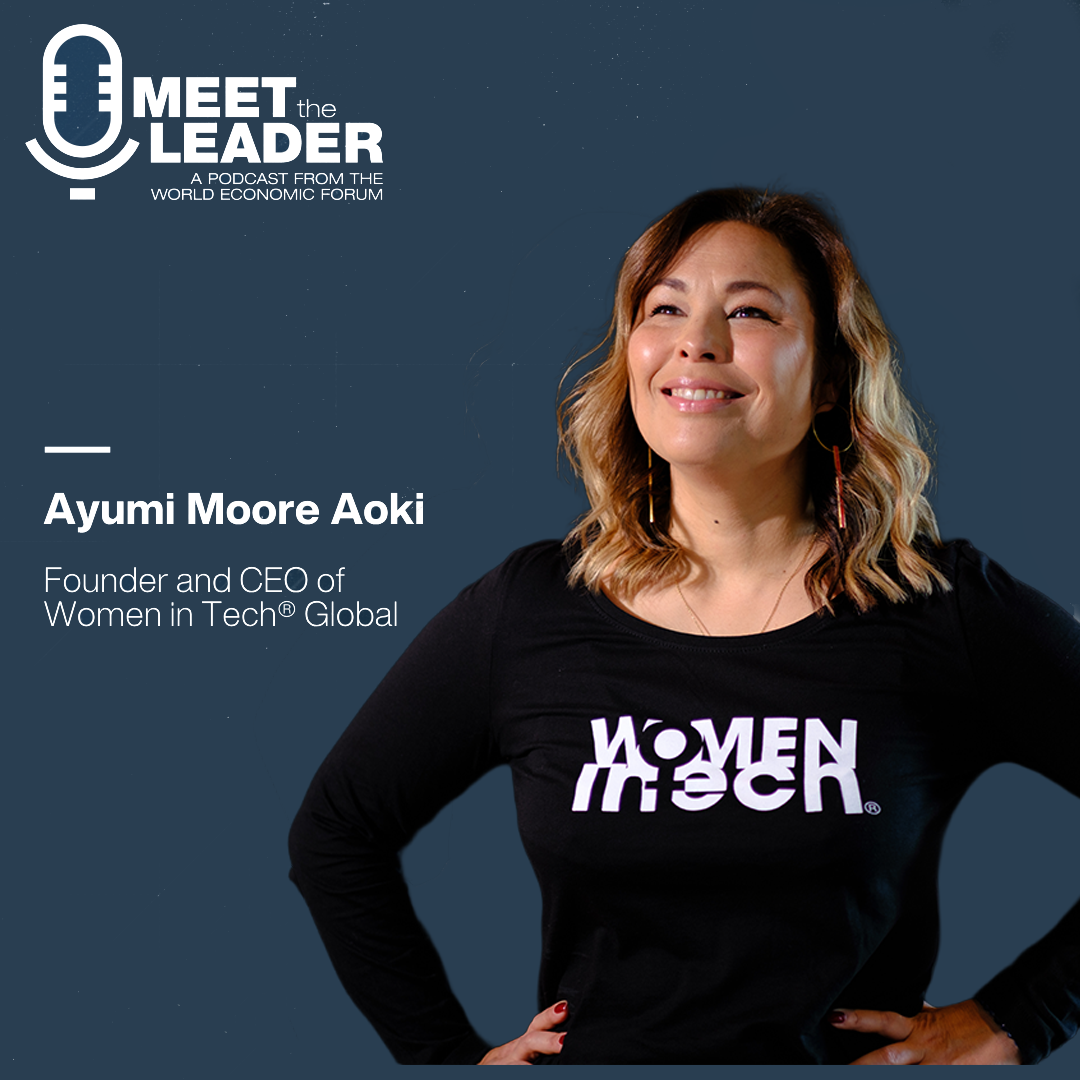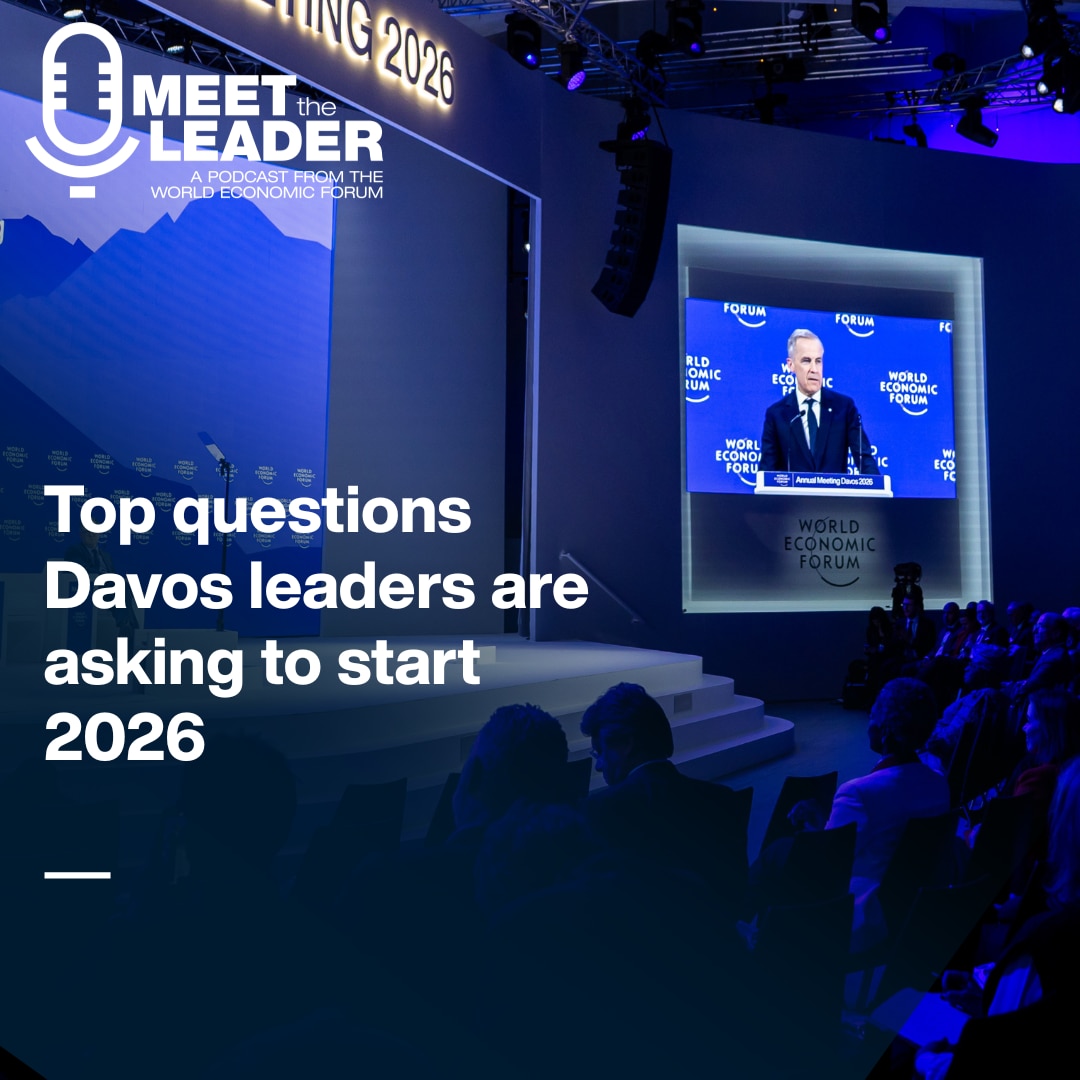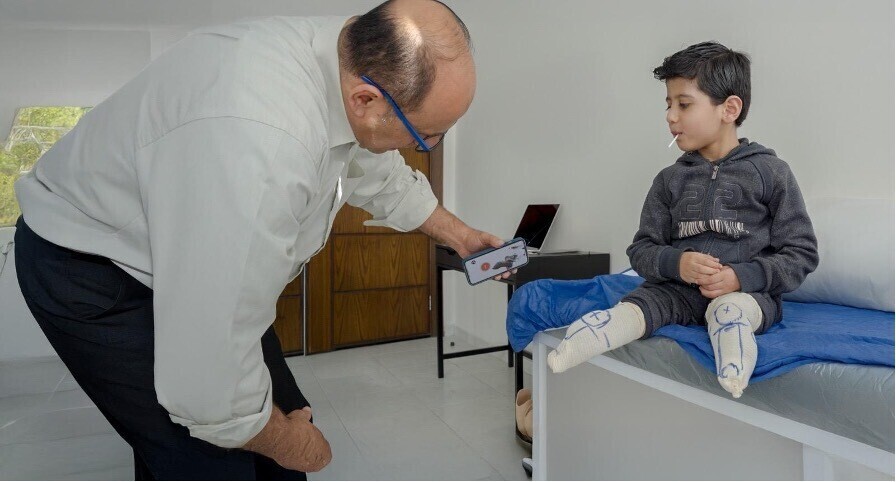How bridging design gaps in science and tech can tackle gender bias
ポッドキャスト・トランスクリプト
Linda Lacina, Meet The Leader Welcome to Meet the Leader, the podcast where top leaders share how they're tackling the world's toughest challenges.
In today's episode, we talk about designing for equity: why it's important, and what leaders need to know about what's holding it back.
Subscribe to Meet the Leader on Apple, Spotify and wherever you get your favorite podcasts. I'm Linda Lacina. From the World Economic Forum. And this is Meet the Leader.
Nigina Muntean, United Nations Population Fund We're missing half of the population, women and girls in the design of the solutions.
Linda Lacina, Meet The Leader Did you know that women are more likely to be killed in a car crash because that car's safety features were probably tested on a male crash test dummy?
Or that women receive just 12% of all artificial heart implants because they're not designed to fit in female chests. The world, in many cases, is just not designed for half the population.
Nigina Muntean knows this well. She is the chief of innovation at the United Nations Population Fund. GS looking to help make research and design more inclusive for women and for everyone.
Her agency launched the Equity 2030 Alliance last year, and that brings together leaders in tech and pharma and other sectors all to share best practices. There's experts in academia, government, business, and they all come together to advocate for new standards, all in equitable investment and to champion new gender inclusive approaches to tech and design.
The group is coming upon its first anniversary and it will celebrate during the United Nations General Assembly Week right here in New York City.
Nigina is also a former physician and a public health expert, and she understands how investments in research and design impact the lives of everyday people - especially those who have the least resources. She shared with me what she's seen on the ground and what's needed to tackle bias in design and what every leader needs to keep in mind.
We'll get into all of that, but first, we'll talk more about equity in design.
Nigina Muntean, United Nations Population Fund The problem is we're missing half of the population, women and girls in the design of the solutions. And it goes across the sector and it goes across different designs science, investment, decision making for financing, car industry, sport. Wherever you take, whatever you touch, women are really are missing out. And we are not talking about some niche market. We're talking about half of the population. And unless we address their needs and include their needs and concerns and voices not only as part of developers or researchers, but also as part of the design step, data step, then it will be just an assumption, basically. And what I we call human-centric is basically male-centric and not gender neutral. It's gender blind because assumption doesn't work. You have to prove it to have metrics of measurements of the data that actually you are equitable in your data set and include those who should be included.
Linda Lacina, Meet The Leader And by not factoring in half the population. What is the potential risk that we have either for health care outcomes, for investments in developments and research? What is the worst-case scenario that could come if we're not factoring in that half of the population?
Nigina Muntean, United Nations Population Fund It goes from being uncomfortable and we talk about that. The size of the phone doesn't fit in my pocket or size of my but it actually can be really dangerous because when we talk that only 22% of clinical trials include women and their design, that means that the risk for four out of five trials do not really work and are not designed for a woman. And that's why women have four times more diverse reaction to medicines which comes to the market. They have to wait four years to be diagnosed because test and diagnostics is not really working on them and not prioritized.
We're talking about, let's say, car industry, where the car safety is still being built on the male crush dummies, still, until now, and women are three times more likely to be severely injured during the car collision.
And we're talking about less lack of access to financing and funding because the decision algorithms do not include actual needs of women and actual metrics around that in the stability index.
if we talk about sport, the shoes for the female athlete are not designed on the female anatomy, which results in up to six times more injuries of the ligaments in the knee, ACL injuries. We're missing out on those stars in the tournament's because they're being injured.
So really, it can be subtle, it can be lethal, or it can be just uncomfortable on your day-to-day basis as well, which is also not okay.
And there is a solution to that. This is not unsolvable. We're not talking about something we really need to engage the greatest minds of the world to resolve it. The solution is so simple. Just include the women when you create something. Make sure it works for them as much as it works to men. And of course, we're talking about women and girls and and all their diversity and there are other layers of disaggregation. But let's even start with that simple one. And I'm sure we can all fight it and advance it.
Linda Lacina, Meet The Leader Can you tell me a little bit about the U.N. Digital Compact is a special self-assessment tool that's really revealing about how inclusive companies even think that they are when they're when they're being asked a question and deciding to tell the truth. Can you tell us a little bit about this? What does that inclusivity, self-assessment tool telling us?
Nigina Muntean, United Nations Population Fund So there are thousands I think it's more than 16,000 companies registered as a part of U.N. Global Compact. And we're talking about the private sector for profit.
There is a self-assessment tool which asks them, do you consider a different impacts of women than men? Do you consider different metrics around your product design for women and men? And less than 20% of them report that they do. And over 40% report they don't even plan to do it. So they don't consider different impacts. They don't consider equitable design and they don't even plan to do it at the moment.
And the rest in between. Yes, they understand there is a need, but they have maybe some plans to do it in the future, but they're not there yet, which for me is a striking number because if only once fifth of the companies are actually making real time efforts to address this issue, then we're definitely not where we want to be.
Linda Lacina, Meet The Leader What are some of the the blindspots that some of these organizations have when it comes for designing for equity?
Nigina Muntean, United Nations Population Fund The blind spot is assumption. I speak of many leading top tech industries, for example, or even pharmaceutical companies, and they say "No. But of course we do. It's logical. It makes sense. Of course we do include women." And when I ask, "look, you do have proof? Do you have numbers? Can you tell me really how does it work?" And they don't.
And from my perspective, if you don't have the data, if you don't have an argument to prove it, then assumption doesn't work. It is unfortunately cheaper to have men as a reference.. It is cheaper to go to the group of people, even including developed countries. They always go to the cheaper and easier, accessible group of people. We know vaccines, a lot of them were developed on military groups and AI was initially developed largely on the male database and that's why it's so historically biased. And it is a really hard formed bias now. And unless we make conscious efforts and, as we say, measure what you treasure and treasure what you measure. So working on assumptions will be always making those solutions blind and not correct.
Linda Lacina, Meet The Leader The companies that are succeeding, the ones that are designing for equity, they've got successful and effective practices. What are those practices? What would that look like?
Nigina Muntean, United Nations Population Fund So the companies who are making conscious efforts to do it, they are also making an investment case, an economic case for that.
So I will give an example. Of those companies who have publicly available real case use cases on those efforts to invest in women-centric solutions, but also to make their product really inclusive.
Let's say Adobe -- and Adobe is like a really top tier of state tech companies -- they have a huge team working specific and they're on inclusivity in design. They have data showing how their market share grows, how the products are more accessible and relevant to all of the population, not only to a part of the population. So we also work with companies like Salesforce, for example, who are doing conscious, really conscious efforts to making sure that that training is inclusive of needs of both man and woman, that pronounced so inclusive of different aspects of the identity of people across the world. The investments are going specifically towards women-centric solutions. And those are really successful companies and those are the companies who can demonstrate you can do well by doing good. Yes, it takes investments, but it pays off as well.
You can do well by doing good. Yes, it takes investments, but it pays off as well.
”And we also know one of the maybe most known across the markets case when the wearables we just on the market. And at first, women consumers were not really buying it. And the companies who are producing wearables started to do the research, what's happening. And women were aware about the product, but they were not buying it because it didn't fit their purpose. It wasn't designed for them, not by style, by size, but also didn't measure those health attributes of your well-being and health which you as a woman would like to measure and track.
So when the wearables companies started to design it with the woman in mind as part of the design already in the first year, the market sale and share grew twice. So we have examples where it works. And it's not only ethical and human rights are a given here, but it's also an investment case. You invest in them, but you your return of investment also is really promising.
Linda Lacina, Meet The Leader And what are these features that maybe are more woman-centric?
Nigina Muntean, United Nations Population Fund Well, you know, women every cell in our body is gendered. So everything in our body is working differently. And if it's not accounted for, you can't assume that the product will work for you. And we are talking about voice recognition, facial recognition, even, let's say hair differences. Let's say the hair of a certain ethnicity is somewhat curly and thick. And when you design like a headset, you think it's comfortable. But if you don't really test that and women have different hairstyles, it will not be.
If you think about the AI recognizing some skin features or even like diseases like lesions, if you tested only on the white skin, it will not work as well on the black skin for sure, because then it's not inclusive. And if we talk about tracking metrics of health, women are going through so many very different transitions in their life and we're talking about menstruation, we're talking about menopause, with different body temperature, different sweating, different colors lose depending on even your age or what hormonal cycle you're going through, or pregnancy related changes. If all of that is wrongly designed based on the male body, 100 it will not work accurately on the emale body. And then I buy the product and use it and it actually doesn't reflect what they need to be there.
Linda Lacina, Meet The Leader You mentioned the Ad Equity 2030 Alliance. Can you tell us a little bit more about it?
Nigina Muntean, United Nations Population Fund So the Alliance is really about using a convening power of UN -- United Nations --to bring together the actors. We are not producers of solutions, be it technology, be science or investments, but we can bring together those who are. And through their actions, through what they do. We can really amplify their reach and reach millions, if not billions of people through their products.
We can also make sure that those investments are going towards the solution and addressing the needs of those billions of people. And we use them as champions to show others that it's possible. Many are in agreement with us. "Yes, it should be done." But then they ask, "Where do we start?"
If others are doing it, our peer companies, our main competitors, let us see what they do. And that's why we really are trying to bring both leaders in the industry, but also the medium-sized and small companies to really be all together in the space in the future, for what they do, to lead others in the same direction.
Linda Lacina, Meet The Leader So they see other people in their cohort. They want to be there as well.
Nigina Muntean, United Nations Population Fund It is a positive peer pressure.
Linda Lacina, Meet The Leader Exactly. Exactly. And folks in the alliance are helping to develop, but also share best practices. What are some best practices that have been sort of developed by some of the partner companies?
Nigina Muntean, United Nations Population Fund So as I mentioned, for example, some companies are really putting in place specific expert teams to ensure that products are inclusive. Some companies, like pharmaceutical companies, are really making commitment and action on those commitments to invest through research and development to women-centric solutions. And this is really important because if you talk global research and development volume, which is about 2.4 trillion U.S. dollars, only 1% globally goes to women-centric solutions out of a whole volume of $2.4 trillion.
And this is not including cancers and oncological diseases, but still is just 1%, which is so, so low. There is a term "life years lost to disability." And in the simple way I can say is the how many years you spend in poor health. And women spending life years in poor health due to the female related conditions. If you put those years all together, it will be much more in developing countries than malaria, tuberculosis and HIV combined.
However, those three infectious diseases are getting more than 50% of global research and development and women's health is still getting just 1%. So it can be very ambitious here and say we'll double or triple it, and we still will not be where we should be. But we're happy to have companies who are putting their money into that and saying we are committing a majority of our investments in R&D, specifically addressing women's health. Or specifically addressing women's health solution needs in education, training, or health care services. And we are trying to demonstrate it and saying this is what they do.
That includes also academia, because academia is a big part of this conversation. We need to produce data and arguments, and academia is investing in that. But we also need to address education of those future researchers, coders, developers, engineers. Because if we train them to be socially agnostic and gender inequitable, it's unfair to expect from them when they graduate that they will suddenly think about it when they develop their products.
If we train them to think about gender equity from the very beginning and inclusivity, and build that inclusivity muscle in them, that we can expect that they will start from the right point of view when they start developing their products.
Linda Lacina, Meet The Leader I think it's interesting you say that it starts even with the training, even at the education level. What are other places, little milestone moments in the design of a product where inclusivity might not being part of the conversation?
Nigina Muntean, United Nations Population Fund I think all stages, and that's the important thing that sometimes -- and oftentimes -- what we see that damage control after the product is already either new, ready or already on the market. Then then we suddenly realize, "Oops, it doesn't work." The voice recognition doesn't recognize as well female voice as male voice or facial recognition doesn't work, or the health care product doesn't really work or is actually creating more harm than than good for women. So really, we need to start from the very beginning.
And we want to normalize this conversation. And when I say normalize, I will bring an example about the gender equality in the workplace. When about 50 years ago, if you see a company only full of men or leadership, only men, we wouldn't question it. Maybe some will think it's not the case, but many will have said, okay, yeah, that's how they operate. Maybe they couldn't find a great expert women on that particular team. Nowadays, if you see that, you question it and you voice this question, I'm concerned. So we normalize this conversation. Maybe we're not there yet in terms of real gender parity at all levels, but we know it's not normal if it's not even being thought about from the beginning. But design is not yet there. So developers are creating products without necessarily thinking about it.
And the question should be asked and that's why those not on the self-assessment, those but also we're working with governments, including this question when they give grants or in the policy regulations or even intellectual property registration, we should be asking them, do you think about it? Do you include women as part of your solution design or not? And if not, please explain. And there are some good examples, like the NIH already not giving grants if the clinical trial doesn't include women or there is no explanation for that and it's not yet across all the levels, of course, all the governments, and it's really only addressed at the regulatory framework level, but really at investment level at all levels and should become a part of the corporate frameworks across industries.
Linda Lacina, Meet The Leader Do you think that we will reach a point where design equity and inclusivity is there. We've got that piece in place. Or do you think that it will always be maybe a moving target?
Nigina Muntean, United Nations Population Fund I think we can. It's a journey, obviously, and it's a journey in the way because there is always something new. And now we're in the place of the Fourth Industrial Revolution, but we know we're already at the dawn of the Fifth Industrial Revolution, where we're bringing robots, machines and humans working together and finding the way of the best collaboration.
So there will be every day something new. But if we normalize that conversation, that inclusivity muscle should be there at all stages of the design, I think we will be there because then it will not be something we ask or have to check. It will be part of everybody's thinking. And with that, I am quite optimistic and hopeful that we will reach that point because we started this conversation some years ago. We didn't even talk about it. So we recognize the problem, and that's already a big and huge starting point. Once you recognize the problem and start to find the ways, how to address it. And as I mentioned at the beginning, it's not something unsolvable. It is actually quite easy. And we know how.
Linda Lacina, Meet The Leader The Forum has an annual piece of research. It puts out. The Global Gender Gap and regularly it's more than 100 years in order to to reach that gender gap. It changes slightly from year to year, but it's always a three-digit number. In your mind, what is the number one thing that has to change to to bridge that gap? And that's a gap both in pay and in leadership and participation in all kinds of industries, including science, technology. In your mind, what is the number one thing that that needs to change globally to bridge that gap?
Nigina Muntean, United Nations Population Fund Diversity. The diversity should be at all levels. That one word diversity. covers so much diversity in the decision makers, teams, diversity in the teams themselves, those who are researchers, engineers, coders, life science experts. Diversity in the design and data set diversity across.
And we actually have some data from the World Intellectual Property Organization who are also part of our alliance that when you have intellectual property requests from the all-female teams, they are 34% more likely to address specific needs of women. So bringing women around the table across all levels and across all the sectors, but also part of the design, that's I would say, the number one answer to many, many problems.
Linda Lacina, Meet The Leader Is there a piece of tech right now for women's health that you think is really, really exciting? And, you know, just something to watch.
Nigina Muntean, United Nations Population Fund I would talk about AI. It's everywhere, right? So I think it's across many sessions and like you drive through San Francisco and every billboard is about AI in one or another sector and I'm actually very excited. I know it should be ethical, rights-based and inclusive and it's not there yet, but it can actually bring so much potential even to the low-resource settings.
There is an assumption that the AI that really high tech and not really working for low-resources and which is actually not true. We have great examples when we use AI-powered ultrasounds for pregnancy or AI-powered chatbots for education and we bring into the really low-resource communities and we see how we can change lives and save lives of so many people.
So we see when we bring those solutions which are not low tech by itself and they can be used even in low-connectivity settings and can save lives of women in the millions basically. So I am really excited about those developments. But at the same time, I'm also conscious that we should make sure that this is done in the right way and do not harm principles should be always there in everything we do.
Linda Lacina, Meet The Leader We talked a little bit about innovations that you're saying are giving us promise. What is maybe something that kind of keeps you up at night when it comes to design or even with a health technology for inclusivity?
Nigina Muntean, United Nations Population Fund A tough question. I think what keeps me up at night is leaving no one behind. It's easy to assume that all we have so much technology, so many projects and resolving and addressing needs of so many people, but there are always those marginalized communities, fathers left behind communities, refugees, people on the move, women and girls who nobody even talk about oftentimes. And those progress and development, which we are all excited about, it doesn't reach them or doesn't reach them in an equitable manner. And again, it takes the conscious efforts to make sure it does reach them. And the progress should be equitable in its benefits.
And I'm a big believer that innovation and technology can equalize opportunities for women and girls. And that's why I called my fund Equalizer [Equalizer Accelerator Fund]. At the same time, it doesn't come automatically. It needs to be consciously addressed of specific efforts. And I think that leaving no one behind is the number one priority in everything which we're trying to do.
Linda Lacina, Meet The Leader What gives you hope?
Nigina Muntean, United Nations Population Fund The number of people I see who are passionate about it, who are in the same space. When we have this conversation, the number of people who are committed to drive this forward, that's what gives me hope because there are many.
And sometimes we come to the companies which are the most number three of the top tech, let's say, or the pharmaceutical industries, and you think, it's such a giant industry, you probably will not be able to move anything there.
Then you find that one champion who is committed and it can be a man and can be a woman. No, there is diversity sometimes. It doesn't have to be only female champions. And they really drive this conversation and then make sure that they bring the industry with them. So those people, those advocates are our arms of change and agents of change. And I really believe that we have that many people who I see already in the space the change is possible.
Linda Lacina, Meet The Leader You have a background in medicine. Can you tell me a little bit about that and what made you make the change to your current role where you're sort of driving innovations and help in a different way?
Nigina Muntean, United Nations Population Fund Yes, I'm a obstetrician, gynecologist and I worked in countries like Papua New Guinea, Gambia, who is a doctor. So I saw firsthand how a simple solution can change thousands of lives. And it's not there. It's not being introduced to those communities.
And I think what was the biggest turning point is the COVID-19 pandemic, which forced us to innovate. So the telemedicine, the remote learning, when everybody got locked down in their homes and the homes in what they were, communities, what they were, but people women didn't get stopped. Women didn't stop being abused. They still needed services, clinical services, health services, and we were forced to innovate on that and make sure that they still receiving those services, commodities, medicines, consultations.
And I think that showed me that that's also not only needed but possible. And it showed me a lot of ways how to do it, even when we're talking about very low-resource communities. The communities may be low resource, but people are resourceful, women are resourceful. We often underestimate the ability of women to act, to make sure that they're doing well and their families are doing well, including in terms of health. And that's what actually gave me a lot of motivation and inspiration to systematize it and start within the organization the Fund, which are now specifically addressing those needs.
Linda Lacina, Meet The Leader What from your background as a physician sort of helps you, maybe a protocol or a way that you would make decisions or choices, that has helped you drive conversations for innovation.
Nigina Muntean, United Nations Population Fund Understanding of those layers of the needs and also from the very different settings. As I said, I work in low-income countries and lowest, least developed countries, but also in the middle income countries.
And I saw those communities. I was there for holding the hands of those women. Sometimes those women who lost their lives because of lack of services and lack of advanced solutions which could be available for them and save them.
So when I speak about that, when I speak about this inclusivity muscle, I know it's not from books or movies or documentaries. I know it because I lived for that. And I can always see that face in front of me when I talk about that woman who is in need. And I think that makes it easier to make people to believe that I am not only preaching on the marketing for something, which is the bureaucratic tagline somewhere, it is actually about the lives of people which I witnessed myself and being part of that, being part of the journey, hands on, really being there. I think that makes it relevant to different communities and that makes my conversation, putting it really on that level of trust, which always helps.
Linda Lacina, Meet The Leader Is there a habit, something that you depend on as a leader now that just would not have occurred to you at the beginning of your career, but something that you really, really employ all the time?
Nigina Muntean, United Nations Population Fund Listening to others. Doesn't matter what level, doesn't matter what level of expertise or seniority. There is always something to learn and a new perspective of other people is always so helpful and beneficial. And I think that listening skills can be lost easily when you think you know it all and you [have certain] experience and the degrees, masters and everything, but the world is evolving and everybody has something to add to the table and and it's value. And I think this is really, really important and becoming even more and more important as I grow in my career that listening to others will always make you as a person, as an expert, more rich in the wealth of knowledge you have and the wealth of solutions you can future.
Linda Lacina, Meet The Leader UNFPA runs a number of innovation challenges. Is there something in your mind that all sort of startups or entrepreneurs need to make sure that they can truly tackle big global challenges? How can we help entrepreneurs and the next generation of problem solvers? What do they need most from us?
Nigina Muntean, United Nations Population Fund Depends, right? So but I will talk about those entrepreneurs we work with and we work with the social entrepreneurs in the developing countries.
First of all, they lack access to funding. And especially we talk about female-led enterprises and female entrepreneurs. The percentage, I think it's less than 7% of those applicants who get actually access to funding and financing. So that's number one, and that's what we're giving through the innovation challenges. We give them the seed grants to help them to mature the innovations to advance it.
Then we want them to become investable because a lot of the VC operating, especially in the Western world, they look at the entrepreneurs as they should make it a million a year or whatever, and then we give them loans, so equity. And it doesn't work in many of those entrepreneurs we work with. They have great solutions and we are vetting those solutions and they actually addressing the problems which are out there in those communities. But we are also helping them to become investable for scale and they can be introduced to the investors to actually take those solutions to the bigger market and bigger scale. But that takes time and mentorship and coaching, and that's why we're always also accompanying our seed grants with the mentorship and coaching and capacity building, because we can bring those experts from those who know already that journey and what should be done there to help them and connect them with those teams, to really help those solutions to reach more people.
Linda Lacina, Meet The Leader Is there a piece of advice that you've always been grateful for.
Nigina Muntean, United Nations Population Fund Be authentic yourself. You know, coming from a developing country, myself, originally, I did have that kind of perception, of. do I fit or now? And I'm a medical doctor and often talk to technology companies. Do I fit the conversation? I think stay true to yourself. If I don't know, I don't know. I ask and I admit I don't know. But if I know, I speak about it and with passion and authority. So. I think this is helping me. Helping in my confidence. Helping in my development. It's also helping me to stay in that path of growth, which I am committed to. And in my career, I never saw my growth as like a vertical ladder. It's kind of almost a jungle gym movement. Sometimes it's lateral, sometimes it's going down and volunteering somewhere. Sometimes it's jumping up and accepting new challenges and new opportunities. But I always did what I love, and throughout my professional career, I never did something I just do for, you know, pay the bills and get salary. You just work somewhere. No, I always did what I really love and passionate about. And I think that's part of also staying true to myself and to my interests and to my beliefs.
Linda Lacina, Meet The Leader That was Nigina Muntean.
Thanks so much to her and thanks so much to you for listening.
To check out more ways leaders are bridging big equity gaps, check out our coverage of this September's Sustainability Development Impact Meetings. It's an event the forum puts on each year during the United Nations General Assembly, and we will share how people are making change happen on the way to tackling the U.N. Sustainability Goals. Follow #SDIM24 online and don't miss a step.
To read our recent Global Gender Gap Report, go to the shownotes of this episode will make sure to have a link
And to listen to more podcasts, including my colleague's podcast, Radio Davos, go to wef.ch/podcasts.
This episode of Meet the Leader was produced and presented by me with Gerry Johansson as Ed Begley as studio engineer in San Francisco, and Gareth Nolan driving studio production. That's it for now. I'm Linda Lacina. From the World Economic Forum. Have a great day.
Gaps in the design of everything from AI to pharmaceuticals lead to everything from safety risk to poor health outcomes. Nigina Muntean, the chief of innovation at the United Nations Population Fund, is looking to fix this, making research and design more inclusive for everyone. Her agency launched the Equity 2030 Alliance last year bringing together leaders in tech and pharma and other sectors to share best practices. Its experts in academia, government and business come together to help advocate for new standards in equitable investment, and to champion more gender-inclusive approaches to tech and design. The group is coming upon its first year anniversary which it celebrated during this year's UN General Assembly Week in New York City. Nigina is also a former physician and a public health expert who understands how investments in research and design impact the lives of everyday people, especially those with the least resources. She shares her first-hand perspectives on what’s needed tackle bias in design and what any leader should keep in mind.
トピック:
公正、多様性、包摂性その他のエピソード:
「フォーラム・ストーリー」ニュースレター ウィークリー
世界の課題を読み解くインサイトと分析を、毎週配信。







